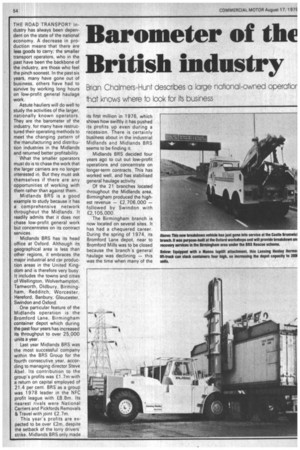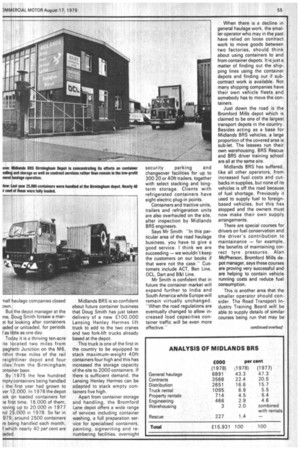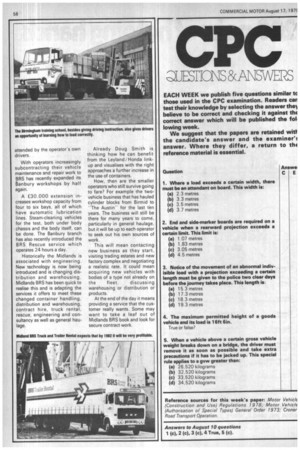Barometer of the British industry
Page 56

Page 57

Page 58

If you've noticed an error in this article please click here to report it so we can fix it.
Brian Chalmers-Hunt describes a large national-owned operatior at knows where to look for its business
THE ROAD TRANSPORT industry has always been dependent on the state of the national economy. A decrease in production means that there are less goods to carry; the smaller transport operators, who in the past have been the backbone of the industry, are those who feel the pinch soonest. In the past six years, many have gone out of business, others have had to survive by working long hours on low-profit general haulage work.
Astute hauliers will do well to study the activities of the larger, nationally known operators. They are the barometer of the industry, for many have restructured their operating methods to meet the changing pattern of the manufacturing and distribution industries in the Midlands and returned better profitability.
What the smaller operators must do is to chase the work that the larger carriers are no longer interested in. But they must ask themselves if there are any opportunities of working with them rather than against them.
Midlands BRS is a good example to study because it has a comprehensive network throughout the Midlands. It readily admits that it does not chase low-profit general work but concentrates on its contract services.
Midlands BRS has its head office at Oxford. Although its geographical area is less than other regions, it embraces the major industrial and car production areas in the United Kingdom and is therefore very busy. It includes the towns and cities of Wellington, Wolverhampton, Tarnworth, Oldbury, Birmingham, Redditch, Worcester, Hereford, Banbury, Gloucester, Swindon and Oxford.
One particular feature of the Midlands operation is the Bromford Lane, Birmingham container depot which during the past four years has increased its throughput to over 25,000 units a year.
Last year Midlands BRS was the most successful company within the BRS Group for the fourth consecutive year, according to managing director Steve Abel. Its contribution to the group's profits was £1.7m-with a return on capital employed of 21.4 per cent. BRS as a group was 1978 leader in the NEC profit league with £8.8m. Its nearest rivals were National Carriers and Pickfords Removals & Travel with joint -£2.7m.
This year's profits are expected to be over £2m, despite the setback of the lorry drivers' strike. Midlands BRS only made its first million in 1976, which shows how swiftly it has pushed its profits up even during a recession. There is certainly business about in the industrial Midlands and Midlands BRS seems to be finding it, Midlands BRS decided four years ago to cut out low-profit operations and concentrate on longer-term contracts. This has worked well, and has stabilised general haulage activity.
Of the 21 branches located throughout the Midlands area, Birmingham produced the highest revenue — £2,706,000 — followed by Swindon with £2,105,000.
The Birmingham branch is now located on several sites. It has had a chequered career. During the spring of 1974, its Bromford Lane depot, near to Bromford Mills was to be closed because the branch's general haulage was declining — this was the time when many of the nail filaulage companies closed own.
Bu the depot manager at the me, oug Smith forsaw a mar.,t fo looking after containers iade or unloaded, for periods f as Ii tle as one day.
To ay it is a thriving ten-acre te !boated two miles from pagh tti Junction on the M6,
■ ithin three miles of the rail reig tuner depot and four riles from the Birmingham antai er base.
By 1975 the few hundred mpty containers being handled 1 the first year had grown to ver 1 .000. In 1976 the depot )ok cn loaded containers for le fir t time. 16,000 of them, rovin up to 20.000 in 1977 nd 25,000 in 1978. So far in 979, around 2500 containers re being handled each month, f whi h nearly 40 per cent are rade
Midlands BRS is so confident about future container business that Doug Smith has just taken delivery of a new £100,000 Lansing Henley Hermes lift truck to add to the two cranes and two fork-lift trucks already based at the depot.
This truck is one of the first in the country to be equipped to stack maximum-weight 40ft containers four high and this has increased the storage capacity of the site to 2000 containers. If there is sufficient demand, the Lansing Henley Hermes can be adapted to stack empty containers five high.
Apart from container storage and handling, the Bromford Lane depot offers a wide range of services including container washing, a full preparation service for specialised containers. painting, signwriting and renumbering facilities, overnight security parking and changeover facilities for up to 300 20 or 40ft trailers, together with select stacking and longterm storage. Clients with refrigerated containers have eight electric plug-in points.
Containers and tractive units, trailers and refrigeration units are also overhauled on the site, after inspection by Midlands BRS engineers.
Says Mr Smith "In this particular area of the road haulage business, you have to give a 'good service. I think we are succeeding — we wouldn't keep the customers on our books if that were not the case." Customers include ACT, Ben Line, OCL, Dart and B&I Line, Mr Smith is confident that in future the container market will expand further to India and South America while Europe will remain virtually unchanged. "When the road regulations are eventually changed to allow increased load capacities container traffic will be even more effective.' When there is a decline in general haulage work, the smaller operator who may in the past have relied on loose contract work to move goods between two factories, should think about using containers to and from container depots. It is just a. matter of finding out the shipping lines using the container depots and finding out if subcontract work is available. Not many shipping companies have their own vehicle fleets and somebody has to move the containers.
Just down the road is the Bromford Mills depot which is claimed to be one of the largest transport depots in the country. Besides acting as a base for Midlands BRS vehicles, a large proportion of the covered area is sub-let. The lessees run their own warehousing. BRS Rescue and BRS driver training school are all at the same site.
Midlands BRS has suffered, like all other operators, from increased fuel costs and cutbacks in supplies, but none of its vehicles is off the road because of fuel shortage. Previously it used to supply fuel to foreignbased vehicles, but this has stopped and the owners must now make their own supply arrangements.
There are special courses for drivers on fuel conservation and the driver's contribution to maintainance — for example, the benefits of maintaining correct tyre pressures. Alan McPherson, Bromford Mills depot manager, says these courses are proving very successful and are helping to contain vehicle running costs and reduce fuel consumption.
This is another area that the smaller operator should consider. The Road Transport Industry Training Board will be able :to supply details of similar courses being run that may be attended by the operator's own drivers.
With operators increasingly subcontracting their vehicle maintenance and repair work to BRS has recently expanded its 8anbury workshops by half again.
A £30,000 extension increases workshop capacity from four to six bays, all of which have automatic lubrication lines. Steam-cleaning vehicles for the test, both under body chassis and the body itself, can be done. The Banbury branch has also recently introduced the BRS Rescue service which operates 24 hours a day.
Historically the Midlands is associated with engineering. New technology is now being introduced and is changing distribution and warehousing. Midlands BRS has been quick to realise this and is adapting the services it offers to meet these changed container handling, distribution and warehousing, contract hire, truck rental, rescue, engineering and consultancy as well as general haulage. Already Doug Smith is thinking how he can benefit from the Leyland / Honda linkup and visualises with the right approaches a further increase in the use of containers.
How, then are the smaller operators who still survive going to fare? For example the twovehicle business that has hauled cylinder blocks from Birmid to
The Austin.' for the last ten years. The business will still be there for many years to come, particularly in general haulage, but it will be up to each operator to seek out his own sources of work.
This will mean contacting new business as they start, visiting trading estates and new factory complex and negotiating a realistic rate. It could mean acquiring new vehicles with bodies of a type not already on the fleet, discussing warehousing or distribution or products.
At the end of the day it means providing a service that the customer really wants. Some may want to take a leaf out of Midlands BRS book and look for secure contract work.








































































































